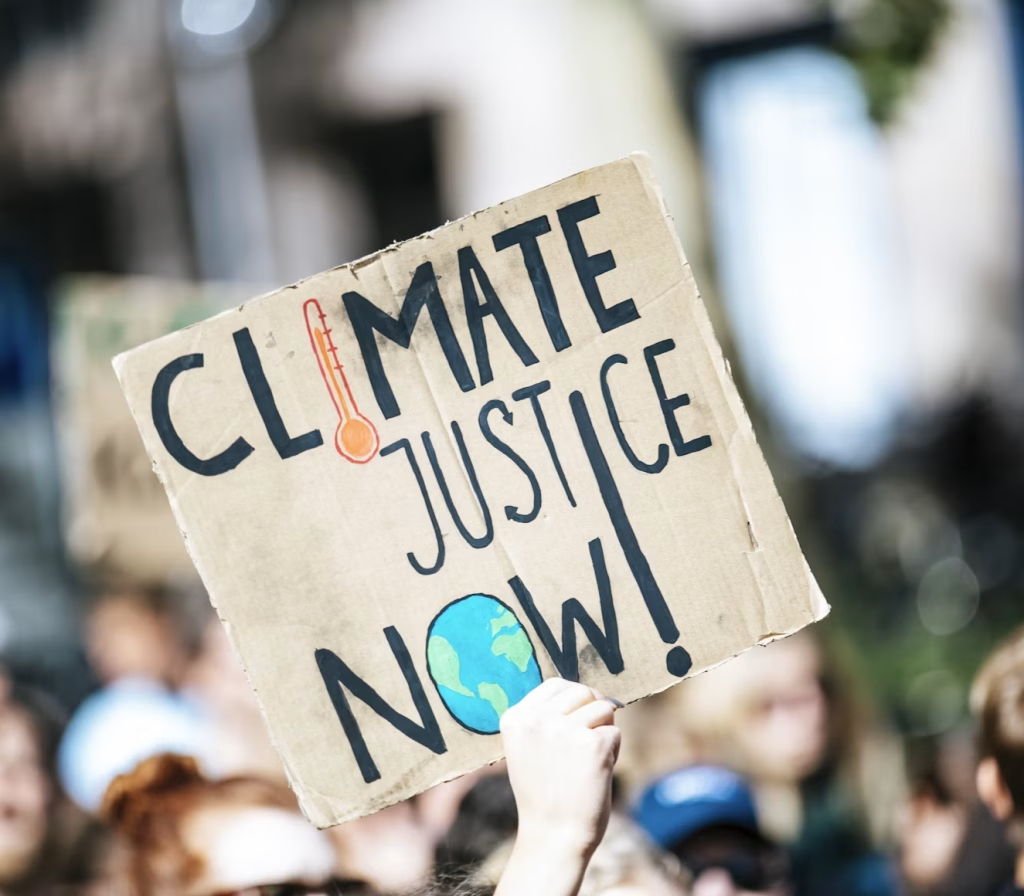by Julia Gaus
What are the obligations of states to protect the environment and climate system from harmful greenhouse gas emissions? And what are the legal consequences for states whose activities have caused harm to the climate system, with regard to vulnerable states and to present and future generations affected by climate change [1]?
Update: The ICJ Ruling
On July 23rd, 2025, the 15 judges of the International Court of Justice (ICJ) issued a rare unanimous ruling finding that countries have “binding obligations to ensure protection of the climate system” and that this constitutes a legal responsibility for which they can be held accountable [8,9]. The ruling is a major victory for the climate movement and vulnerable states, as it obliges states to “prevent significant damage to the environment” and creates a pathway for countries to claim reparations for losses and damages suffered due to the climate crisis [8, 9, 10]. The process involved the highest level of participation the ICJ has seen in a proceeding, with almost 200 written and oral statements submitted [8,9]. The significance of the ruling is further reflected in the vast media coverage it generated [see 9 – 13]. Experts expect the ruling to have wide-reaching implications for climate litigation, hopefully compelling countries to adopt stronger emissions targets and to accelerate the transition away from fossil fuels [9].
Read below to understand how the ruling came about.
UN General Assembly asks ICJ to clarify
It is these questions the United Nations General Assembly (UNGA) has asked the International Court of Justice (ICJ) to clarify. The resolution which passed on March 29th, 2023 without a vote was initiated by law students from the organisation Pacific Islands Students Fighting Climate Change (PISFCC) and brought to the General Assembly (GA) by Pacific nations, spearheaded by Vanuatu [2]. Heralded a “historic resolution” and “victory for climate justice” the resolution was sponsored by over 120 countries, but notably not the US [2]. Following the adoption of the resolution most countries of the GA expressed their support, with Costa Rica highlighting the “clear commitment of States to ramp up climate and environmental action”, while Tonga emphasised the impact of the Pacific Youth whose vision and energy are a continuous source of inspiration and Sierra Leone noting that “the importance of the request of the Court’s advisory opinion [. . .] cannot be overstated” [3]. Vanuatu’s prime minister expressed hope that the resolution would be “the beginning of a new era in multilateral climate cooperation” [4].
What does it mean for Climate Justice?
The ICJ is the UN system’s highest judicial body [5]. It is usually asked to hear ‘contentious cases’ (i.e. disputes between countries), but it can also be requested by a UN institution to issue advisory opinions: a kind of general interpretation of the status of international law on a topic [6]. However, these opinions are not binding in domestic courts.
So, what are sponsors of the resolution looking to achieve? According to initial responses to the adoption of the resolution its supporters hope that the ICJ’s opinion will:
- Establish international legal rules that might influence domestic judges [2],
- Strengthen climate-related litigation efforts by providing advocates and vulnerable states with instruments to hold other countries accountable [2],
- Encourage states to reflect on their actions and inactions and what they need to do going forward [3], and
- Strengthen the link between climate harm and human rights [6]
Furthermore, while the advisory opinion of the ICJ will not be binding, the existing international laws upon which it will draw, such as the UN Convention on the Rights of the Child or the International Covenant on Civil and Political Rights, are binding and applicable right away [4].
The specific questions the ICJ is asked to answer are:
a) What are the obligations of States under international law to ensure the protection of the climate system and other parts of the environment from anthropogenic emissions of greenhouse gases for States and for present and future generations;
(b) What are the legal consequences under these obligations for States where they, by their acts and omissions, have caused significant harm to the climate system and other parts of the environment, with respect to:
(i) States, including, in particular, small island developing States, which due to their geographical circumstances and level of development, are A/77/L.58 4/4 23-03831 injured or specially affected by or are particularly vulnerable to the adverse effects of climate change?
(ii) Peoples and individuals of the present and future generations affected by the adverse effects of climate change? [1]
Looking forward
Having adopted the resolution, the UN will now communicate it to the ICJ. The court will then be hearing arguments brought forward by different stakeholders. This will take several months, with the advisory opinion expected to be issued six to 12 months after the end of the hearings [6]. So, the ICJ may come to its conclusions on the matter by late 2024.
In the meantime climate litigation cases are going forward [check out the YCLD section to learn more about youth climate litigation]. The litigation route has proven to be an effective way to enhance and enforce government’s climate commitments, with children and youth often raising their voices to hold governments accountable [7]. In this context the adoption of the “Request for an advisory opinion of the International Court of Justice on the obligations of States in respect of climate change” by the UNGA highlights again the strength of collective youth voices and is a great win for climate activism.
References:
[1] United Nations General Assembly (2023), Doc No. A/77/L.58, Request for an advisory opinion of the International Court of Justice on the obligations of States in respect of climate change, https://documents-dds-ny.un.org/doc/UNDOC/LTD/N23/063/82/PDF/N2306382.pdf?OpenElement [Accessed: 06.04.2023]
[2] Lakhani, N. (29.03.2023), United Nations adopts landmark resolution on climate justice, The Guardian, https://www.theguardian.com/environment/2023/mar/29/united-nations-resolution-climate-emergency-vanuatu [Accessed: 06.04.2023]
[3] United Nations (29.03.2023), General Assembly Adopts Resolution Requesting International Court of Justice Provide Advisory Opinion on States’ Obligations Concerning Climate Change, United Nations Meetings Coverage and Press Releases, https://press.un.org/en/2023/ga12497.doc.htm [Accessed: 06.04.2023]
[4] Guardian staff with agencies (30.03.2023), ‘Beginning of a new era’: Pacific islanders hail UN vote on climate justice, The Guardian, https://www.theguardian.com/world/2023/mar/30/un-vote-on-climate-justice-pacific-island-change-crisis-united-nations-vanuatu?CMP=Share_iOSApp_Other [Accessed: 06.04.2023]
[5] IISD (05.04.2023), UNGA Asks ICJ for Advisory Opinion on Climate Obligations of States, IISD – SDG Knowledge Hub, http://sdg.iisd.org/news/unga-asks-icj-for-advisory-opinion-on-climate-obligations-of-states/#:~:text=The%20UN%20General%20Assembly%20 [Accessed: 08.04.2023]
[6] Peel, J. & Nay, Z. (03.04.2023), The UN is asking the International Court of Justice for its opinion on states’ climate obligations. What does this mean?, The Conversation, https://theconversation.com/the-un-is-asking-the-international-court-of-justice-for-its-opinion-on-states-climate-obligations-what-does-this-mean-202943, [Accessed: 08.04.2023]
[7] Setzer, J. & Higham, C. (30.06.2022), Global trends in climate litigation: 2022 snapshot, LSE Grantham Research Institute on Climate Change and the Environment, https://www.lse.ac.uk/granthaminstitute/publication/global-trends-in-climate-change-litigation-2022/, [Accessed: 08.04.2023]
[8] International Court of Justice (23.07.25), Obligations of States in respect of Climate Change Summary of the Advisory Opinion of 23 July 2025, International Court of Justice, https://www.icj-cij.org/sites/default/files/case-related/187/187-20250723-sum-01-00-en.pdf
[9] Dunne, D., Gabbatis, J., Lempriere, M. (25.07.2025),ICJ: What the world court’s landmark opinion means for climate change, CarbonBrief, https://www.carbonbrief.org/icj-what-the-world-courts-landmark-opinion-means-for-climate-change/ [Accessed: 24.08.2025]
[10] Frost, R. (25.07.2025) Five key takeaways from the ICJ’s historic climate ruling and what comes next, euronews., https://www.euronews.com/green/2025/07/25/five-key-takeaways-from-the-icjs-historic-climate-ruling-and-what-comes-next [Accessed: 24.08.2025]
[11] (23.07.2025), World Court says countries are legally obligated to curb emissions, protect climate, UN News, https://news.un.org/en/story/2025/07/1165475 [Accessed: 24.08.2025]
[12] CIEL Press room (23.07.2025) , The Era of Climate Impunity is Over— By Order of the World’s Highest Court, https://www.ciel.org/news/icj-climate-opinion-ends-fossil-fuel-impunity/ [Accessed: 24.08.2025]
[13] Mustafa, E. (01.08.2025), Why the ICJ’s advisory opinion on climate change opens the window for a new, restorative vision of environmental law in India, The Indian Express, https://indianexpress.com/article/explained/explained-climate/icj-advisory-opinion-climate-change-10163980/ [Accessed: 24.08.2025]

